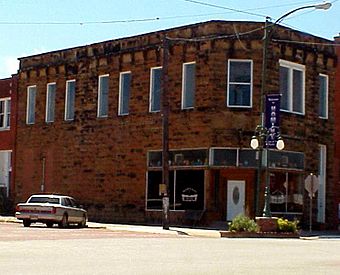Bank of Hominy facts for kids
The Bank of Hominy is an old building in Hominy, Oklahoma. It was built in 1906. This was just two years after a big oil boom in Oklahoma. The building is special because of its unique style. It's one of only a few like it in Osage County, Oklahoma.
Quick facts for kids |
|
|
Bank of Hominy
|
|
 |
|
| Location | 102 W. Main St., Hominy, Oklahoma |
|---|---|
| Built | 1906 |
| Architectural style | Romanesque |
| MPS | Richardsonian Romanesque Banks of Osage County TR |
| NRHP reference No. | 84000316 |
| Added to NRHP | November 23, 1984 |
The Historic Bank of Hominy Building
The Bank of Hominy is one of four small bank buildings built in a special style. This style is called Richardsonian Romanesque. These banks were built in Osage County, Oklahoma between 1904 and 1911. The other banks are the Bank of Burbank, Bank of Bigheart, and Osage Bank of Fairfax.
Building's Unique Style and Look
The building is made from local sandstone. It has two floors. The building is about 25 feet (7.6 m) wide and 40 feet (12 m) long. It has a flat roof. There is also a low wall around the roof, about 2 feet (0.61 m) high.
On the front of the building, between the first and second floors, you can see an inscription. It is made of stone and reads, "The Bank of Hominy." Not much has changed about the building's look since it was built. Only two large display windows were added on the ground floor.
A Bit of History
The Bank of Hominy was the only bank in town for many years. It stayed open until 1938. This was during the Great Depression, a time when many businesses struggled. The bank had to close its doors.
The building is important because it is the oldest bank building in Hominy. It is also a great example of its architectural style. This style was used for business buildings in Osage County, Oklahoma.
After the bank closed, a man named Clyde M. Frazier bought the building. He turned the first floor into a store that sold car parts. It stayed an auto parts store until at least 1984. The second floor has always been used as offices for different professionals.
In 1984, the building was added to the National Register of Historic Places. This means it is recognized as an important historical site.
 | John T. Biggers |
 | Thomas Blackshear |
 | Mark Bradford |
 | Beverly Buchanan |



